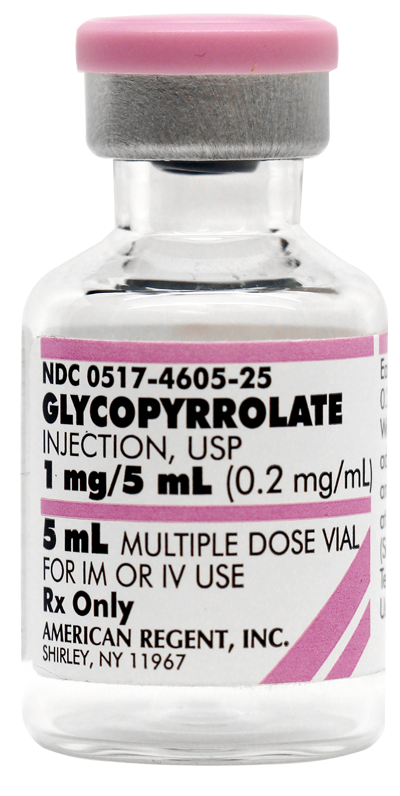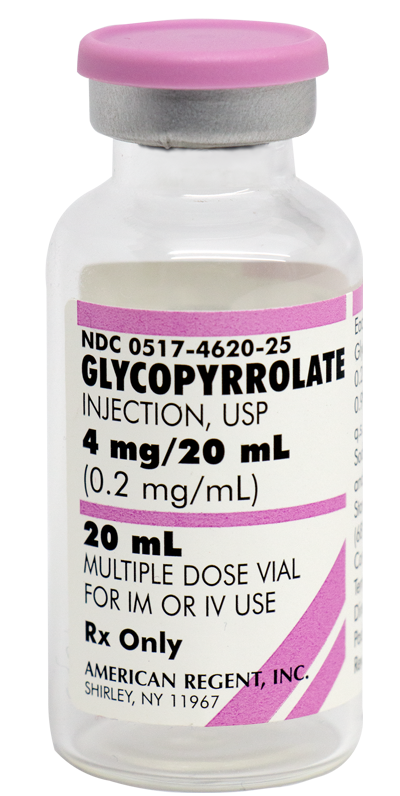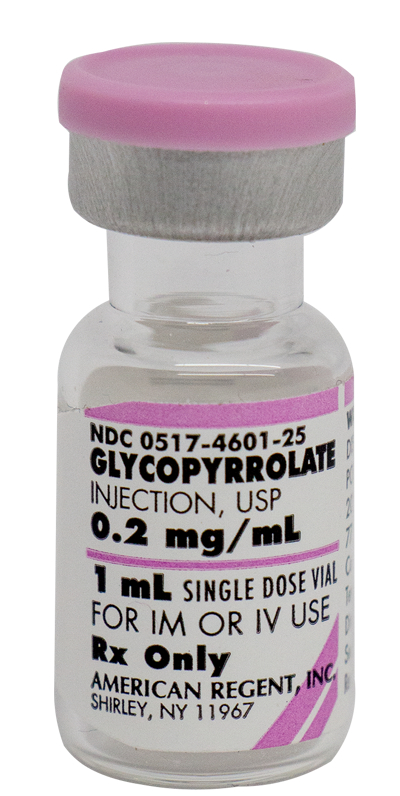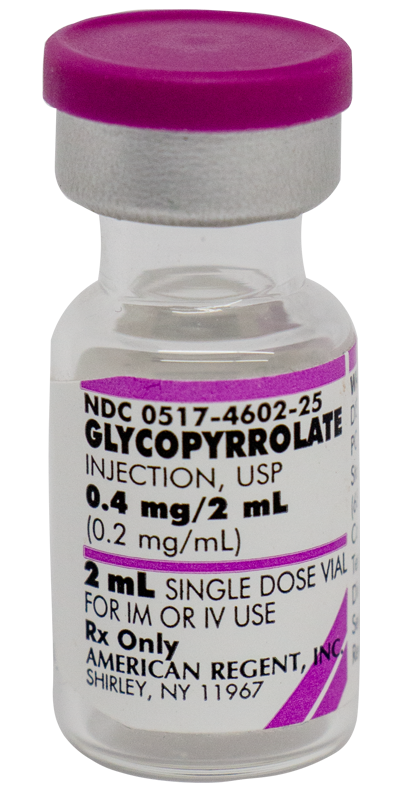Contact Us
By clicking Submit, you confirm that you accept our Privacy Policy and that you agree to your personal contact information being used to contact you and added to our database. If at any time you wish your personal information to be removed from the American Regent® database, please submit a message request to corpcommunications@americanregent.com.
For Intramuscular or Intravenous Administration
NOT FOR USE IN NEONATES
CONTAINS BENZYL ALCOHOL
INDICATIONS AND USAGE
In Anesthesia: Glycopyrrolate injection is indicated for use as a preoperative antimuscarinic to reduce salivary, tracheobronchial, and pharyngeal secretions; to reduce the volume and free acidity of gastric secretions; and, to block cardiac vagal inhibitory reflexes during induction of anesthesia and intubation. When indicated, glycopyrrolate injection may be used intraoperatively to counteract surgically or drug-induced or vagal reflexes associated arrhythmias. Glycopyrrolate protects against the peripheral muscarinic effects (e.g., bradycardia and excessive secretions) of cholinergic agents such as neostigmine and pyridostigmine given to reverse the neuromuscular blockade due to non-depolarizing muscle relaxants.
In Peptic Ulcer: For use in adults as adjunctive therapy for the treatment of peptic ulcer when rapid anticholinergic effect is desired or when oral medication is not tolerated.
IMPORTANT SAFETY INFORMATION
CONTRAINDICATIONS
Known hypersensitivity to glycopyrrolate or any of its inactive ingredients.
In the management of peptic ulcer patients, glycopyrrolate injection may be contraindicated in patients with the following concurrent conditions: glaucoma; obstructive uropathy; obstructive disease of the gastrointestinal tract; paralytic ileus, intestinal atony of the elderly or debilitated patient; unstable cardiovascular status in acute hemorrhage; severe ulcerative colitis; toxic megacolon complicating ulcerative colitis; myasthenia gravis.
WARNINGS
This drug should be used with great caution, if at all, in patients with glaucoma.
There have been rare reports of deaths, primarily in preterm infants, associated with exposure to excessive amounts of benzyl alcohol.
Glycopyrrolate Injection may produce drowsiness or blurred vision. The patient should be cautioned regarding activities requiring mental alertness such as operating a motor vehicle or other machinery or performing hazardous work while taking this drug.
In addition, in the presence of fever, high environmental temperature and/or during physical exercise, heat prostration can occur with use of anticholinergic agents including glycopyrrolate (due to decreased sweating), particularly in children and the elderly.
Diarrhea may be an early symptom of incomplete intestinal obstruction, especially in patients with ileostomy or colostomy. In this instance treatment with glycopyrrolate injection would be inappropriate and possibly harmful.
PRECAUTIONS General
Investigate any tachycardia before giving glycopyrrolate injection since an increase in the heart rate may occur.
Use with caution in patients with: coronary artery disease; congestive heart failure; cardiac arrhythmias; hypertension; hyperthyroidism.
Use glycopyrrolate with caution in the elderly and in all patients with autonomic neuropathy, hepatic disease, ulcerative colitis, prostatic hypertrophy, or hiatal hernia.
The use of anticholinergetic drugs in the treatment of gastric ulcer may produce a delay in gastric emptying due to antral statis.
Drug Interactions
The concurrent use of glycopyrrolate injection with other anticholinergics or medications with anticholinergic activity may intensify the antimuscarinic effects and may result in an increase in anticholinergic side effects. Concomitant administration of glycopyrrolate injection and potassium chloride in a wax matrix may increase the severity of potassium chloride-induced gastrointestinal lesions as a result of a slower gastrointestinal transit time.
Pregnancy
Teratogenic Effects-Pregnancy Category B: This drug should be used during pregnancy only if clearly needed. Single-dose studies in humans found that very small amounts of glycopyrrolate passed the placental barrier.
Nursing Mothers
Because many drugs are excreted in human milk, caution should be exercised when glycopyrrolate injection is administered to a nursing woman. As with other anticholinergics, glycopyrrolate may cause suppression of lactation.
Pediatric Use
Due to its benzyl alcohol content, glycopyrrolate injection should not be used in neonates.
Safety and effectiveness in pediatric patients have not been established for the management of peptic ulcer.
Dysrhythmias associated with the use of glycopyrrolate intravenously as a premedicant or during anesthesia have been observed in pediatric patients.
Infants and young children are especially susceptible to the toxic effects of anticholinergics.
Geriatric Use
In general, dose selection for an elderly patient should be cautious.
ADVERSE REACTIONS
Adverse reactions may include xerostomia; urinary hesitancy and retention; blurred vision and photophobia due to mydriasis; cycloplegia; increased ocular tension; tachycardia; palpitation; decreased sweating; loss of taste; headache; nervousness; drowsiness; weakness; dizziness; insomnia; nausea; vomiting; impotence; suppression of lactation; constipation; bloated feeling; severe allergic reactions including anaphylactic/anaphylactoid reactions; hypersensitivity; urticaria, pruritus, dry skin and other dermal manifestations; some degree of mental confusion and/or excitement, especially in elderly persons.
Post-marketing Experience
The following adverse events have been reported with glycopyrrolate: malignant hyperthermia; cardiac arrhythmias; cardiac arrest; hypertension; hypotension; seizures; and respiratory arrest. Postmarketing reports have included cases of heart block and QTc interval prolongation associated with the combined use of glycopyrrolate and an anticholinesterase. Injection site reactions including pruritus, edema, erythema, and pain have also been reported.
OVERDOSAGE
To combat peripheral anticholinergic effects, a quaternary ammonium anticholinesterase such as neostigmine methylsulfate may be given. If CNS symptoms occur, physostigmine may be used. To combat hypotension, administer IV fluids and/or pressor agents. Fever should be treated symptomatically. In the event of a curare-like effect on respiratory muscles, artificial respiration should be instituted and maintained until effective respiratory action returns.
For additional Safety Information, please see Full Prescribing Information. You are encouraged to report adverse drug events to American Regent Inc. at 1-800-734-9236 or to the FDA by visiting www.fda.gov/medwatch or calling 1-800-FDA-1088.
REF-0893 11/2018



